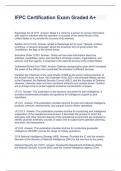Sedition act of 1918 - Study guides, Class notes & Summaries
Looking for the best study guides, study notes and summaries about Sedition act of 1918? On this page you'll find 50 study documents about Sedition act of 1918.
Page 4 out of 50 results
Sort by
IFPC Certification Exam Graded A+
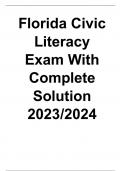
-
Florida Civic Literacy Exam With Complete Solution 2023/2024
- Exam (elaborations) • 7 pages • 2023
-
Available in package deal
-
- $12.49
- + learn more
Florida Civic Literacy Exam Brown v. Board of Education - Answer 1954 - The Supreme Court overruled Plessy v. Ferguson, declared that racially segregated facilities are inherently unequal and ordered all public schools desegregated. McCulloch v. Maryland - Answer 1819 - The Supreme Court ruled that congress had the authority to establish a federal bank that could not be taxed by states. Established that congress could have powers not explicitly described in the constitution. Gibbon...
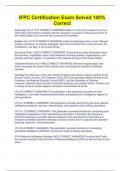
-
IFPC Certification Exam Solved 100% Correct
- Exam (elaborations) • 5 pages • 2023
- Available in package deal
-
- $10.99
- + learn more
IFPC Certification Exam Solved 100% Correct
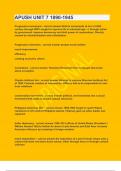
-
APUSH UNIT 7 1890-1945|UPDATED&VERIFIED|GUARANTEED SUCCESS
- Exam (elaborations) • 5 pages • 2023
-
Available in package deal
-
- $13.99
- + learn more
Progressive movement Reform movements at turn of 20th century through WW1 sought to improve life in industrial age --> through action by government. improve democracy and limit power of corporations. Directly caused by industrialization and urbanization. Progressive reformers protect social welfare moral improvement efficiency creating economic reform muckrakers Theodore Roosevelt term for people that wrote about corruption Clayton Antitrust Act Attempt to improve ...
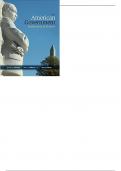
-
Test Bank For American Government Institutions & Policies 14th Edition by James Q. Wilson
- Exam (elaborations) • 292 pages • 2023
-
Available in package deal
-
- $31.94
- + learn more
CHAPTER 3 Federalism MULTIPLE CHOICE 1. When the Framers drafted the Constitution, the Antifederalist opposed it primarily on the grounds that the new government a. empowered state governments. b. created a bicameral Congress. c. gave states the power to coin money. d. created a navy. e. gave too much power to the national government. ANS: E REF: 51 NOT: F OBJ: LO1 2. In this decision, the Supreme Court, by a 5–4 majority, ruled that the individual mandate component of Obamacare was...
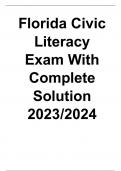
-
Florida Civic Literacy Exam With Complete Solution 2023/2024
- Exam (elaborations) • 7 pages • 2023
-
Available in package deal
-
- $12.99
- + learn more
Brown v. Board of Education - Answer 1954 - The Supreme Court overruled Plessy v. Ferguson, declared that racially segregated facilities are inherently unequal and ordered all public schools desegregated. McCulloch v. Maryland - Answer 1819 - The Supreme Court ruled that congress had the authority to establish a federal bank that could not be taxed by states. Established that congress could have powers not explicitly described in the constitution. Gibbons v. Ogden - Answer 1824 - "The...
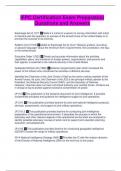
-
IFPC Certification Exam Preparation Questions and Answers
- Exam (elaborations) • 5 pages • 2024
-
Available in package deal
-
- $9.49
- + learn more
Espionage Act of 1917 Made it a crime for a person to convey information with intent to interfere with the operation or success of the armed forces of the United States or to promote the success of its enemies. Sedition Act of 1918 added to Espionage Act to cover "disloyal, profane, scurrilous, or abusive language" about the American form of government, the Constitution, the flag, or the armed forces. Executive Order 12333 Timely and accurate information about the activities, capabilities, p...
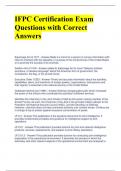
-
IFPC Certification Exam Questions with Correct Answers
- Exam (elaborations) • 5 pages • 2023
-
Available in package deal
-
- $8.99
- + learn more
IFPC Certification Exam Questions with Correct Answers Espionage Act of 1917 - Answer-Made it a crime for a person to convey information with intent to interfere with the operation or success of the armed forces of the United States or to promote the success of its enemies. Sedition Act of 1918 - Answer-added to Espionage Act to cover "disloyal, profane, scurrilous, or abusive language" about the American form of government, the Constitution, the flag, or the armed forces. Executive...
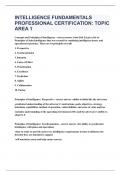
-
INTELLIGENCE FUNDAMENTALS PROFESSIONAL CERTIFICATION: TOPIC AREA 1|UPDATED&VERIFIED|100% SOLVED|GUARANTEED SUCCESS
- Exam (elaborations) • 11 pages • 2023
-
- $15.99
- + learn more
Concepts and Principles of Intelligence Joint Pub 2.0 gives list of Principles of Joint Intelligence that was created by combining intelligence theory and operational experience. There are 10 principles overall: 1. Perspective 2. Synchronization 3. Integrity 4. Unity of Effort 5. Prioritization 6. Excellence 7. Prediction 8. Agility 9. Collaboration 10. Fusion Principles of Intelligence: Perspective -ability to think like the adversary -predicated understanding of the adversa...
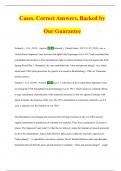
-
Cases. Correct Answers, Backed by Our Guarantee
- Exam (elaborations) • 13 pages • 2024
-
- $11.49
- + learn more
Schenck v. U.S. (1919) - Answer Schenck v. United States, 249 U.S. 47 (1919), was a United States Supreme Court decision that upheld the Espionage Act of 1917 and concluded that a defendant did not have a First Amendment right to express freedom of speech against the draft during World War I. Ultimately, the case established the "clear and present danger" test, which lasted until 1969 when protection for speech was raised in Brandenburg v. Ohio to "Imminent lawless action". Abrams v. U...

How did he do that? By selling his study resources on Stuvia. Try it yourself! Discover all about earning on Stuvia

